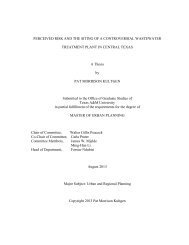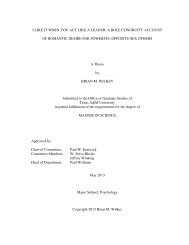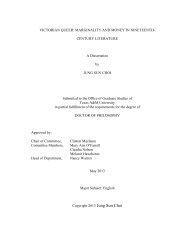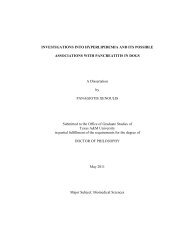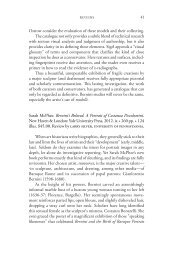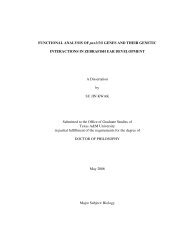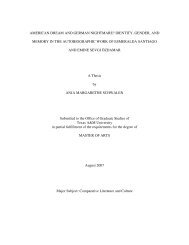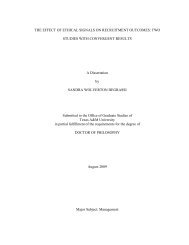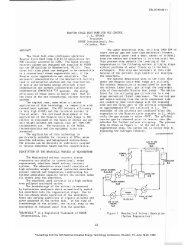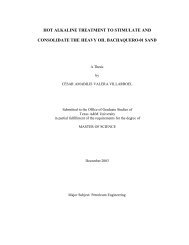A Dissertation by GRACE HUI-CHIN LIN Submitted to the Office of ...
A Dissertation by GRACE HUI-CHIN LIN Submitted to the Office of ...
A Dissertation by GRACE HUI-CHIN LIN Submitted to the Office of ...
You also want an ePaper? Increase the reach of your titles
YUMPU automatically turns print PDFs into web optimized ePapers that Google loves.
ackgrounds and gender difference in communication did provide evidence for<br />
“intentionality” that Faerch and Kasper had argued. The following four cases<br />
showing how students chose <strong>the</strong> strategies explain why <strong>the</strong> “intentionality” <strong>of</strong><br />
selecting a certain strategy exists in <strong>the</strong> communication.<br />
First, Jian Guo stated how he intended <strong>to</strong> systemize and manage numerous<br />
learned skills in order <strong>to</strong> reach his purpose <strong>of</strong> expressing himself. In <strong>the</strong> fourth<br />
findings, Jian Guo described how he always combined <strong>the</strong> usages <strong>of</strong> interlanguage<br />
strategy and cooperation strategy in order <strong>to</strong> attain a fully comprehensive input<br />
during communication. Jian Guo felt that <strong>the</strong> routine processes he had completed for<br />
attaining <strong>the</strong> comprehensive communication were as follows. First, he would make a<br />
comprehension check through cooperation strategy whenever encountering a<br />
situation where he received a vague message created through interlanguage <strong>by</strong> his<br />
partners. Second, he would tell what <strong>the</strong> vocabulary was <strong>to</strong> his partners who<br />
expressed it vaguely in order <strong>to</strong> achieve a purpose <strong>of</strong> learning <strong>to</strong>ge<strong>the</strong>r. Jain Guo’s<br />
intentionality appearing in communication was that he always chose <strong>to</strong> use <strong>the</strong><br />
cooperation strategy <strong>to</strong> react <strong>to</strong> a condition where a vague meaning existed in <strong>the</strong><br />
conversation.<br />
Cheng Chih described how his newly created words displayed his intention<br />
that he would translate Chinese <strong>to</strong> English whenever he talked <strong>to</strong> people who were<br />
from a Chinese background. Cheng Chih implied that <strong>the</strong> English speakers <strong>of</strong><br />
Chinese societies, such as Taiwan, China, or Singapore, would be accus<strong>to</strong>med <strong>to</strong><br />
using <strong>the</strong> interlanguage strategy analytically and au<strong>to</strong>matically because <strong>of</strong> following<br />
<strong>the</strong> ances<strong>to</strong>r’s methods <strong>of</strong> creating words.<br />
180<br />
Inspired <strong>by</strong> Cheng Chih’s perceptions and Faerch and Kasper’s <strong>the</strong>ory <strong>of</strong>



